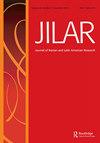Second Time Around: A Re-Evaluation of the Function of the Fantastic in “Segunda vez” by Julio Cortázar
IF 0.3
0 HUMANITIES, MULTIDISCIPLINARY
Journal of Iberian and Latin American Research
Pub Date : 2023-01-02
DOI:10.1080/13260219.2023.2221410
引用次数: 0
Abstract
ABSTRACT “Segunda vez” is one of a few overtly political texts from Julio Cortázar’s 1977 collection Alguien que anda por ahí, describing the inexplicable disappearance of a civilian at an anonymous government ministry. Despite the narrative’s Argentine setting and clear allusions to the situation of the desaparecidos, critical evaluations of the story have historically been divided about whether to classify it as fantastic or political. These differences in interpretation can primarily be seen to belong to English-language and Spanish-language criticism respectively. This article argues for the reassessment of Cortázar’s later stories through a close reading of “Segunda vez” and its licensed translations, and explores the various possible factors that have contributed to the differences in critical interpretations of the text between Latin America and the English-speaking world. It is concluded that the mode of the fantastic is employed by Cortázar to evoke his ideological concerns.第二次:重新评价胡里奥·科尔塔《Segunda vez》中幻想的作用
胡里奥(Julio) Cortázar 1977年的文集《Alguien que anda por ahí》中为数不多的几篇带有明显政治含义的文章之一,描述了一名平民在一个不知名的政府部门莫名其妙地失踪。尽管故事以阿根廷为背景,并明确暗示了desaparecidos的处境,但对这个故事的批评评价在历史上一直存在分歧,即是将其归类为奇幻小说还是政治小说。这些解释上的差异主要可以看作分别属于英语和西班牙语批评。本文透过细读《第二回合》及其授权译本,主张重新评估Cortázar的后期故事,并探讨导致拉丁美洲与英语世界对文本的批判性解读差异的各种可能因素。最后得出结论,Cortázar运用了荒诞的模式来唤起他的意识形态关注。
本文章由计算机程序翻译,如有差异,请以英文原文为准。
求助全文
约1分钟内获得全文
求助全文
来源期刊

Journal of Iberian and Latin American Research
HUMANITIES, MULTIDISCIPLINARY-
CiteScore
0.60
自引率
0.00%
发文量
22
 求助内容:
求助内容: 应助结果提醒方式:
应助结果提醒方式:


